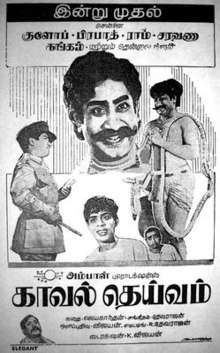Kaaval Dheivam
Kaaval Dheivam (transl. Guardian deity) is a 1969 Indian Tamil-language drama film, directed by K. Vijayan and produced by S. V. Subbaiah. An adaptation of the novel Kai Vilangu by Jayakanthan,[2] the film stars Sivaji Ganesan, Sowcar Janaki, Lakshmi and Nagesh in lead roles. The film was a moderate success at box-office. The film was remade in Kannada as Devara Mane (1985).[3]
| Kaaval Dheivam | |
|---|---|
 Film poster | |
| Directed by | K. Vijayan |
| Produced by | S. V. Subbaiah |
| Story by | Jayakanthan |
| Starring | Sivaji Ganesan Sivakumar Lakshmi Nagesh |
| Music by | G. Devarajan |
| Cinematography | Vijayan |
Production company | Ambal Productions |
Release date |
|
Running time | 145 minutes[2] |
| Country | India |
| Language | Tamil |
Plot
Aanaikundram Jail. Superintendent K. Raghavan is a man of integrity and humaneness who views the 500 inmates as 500 books that need to be perused. He stays with his wife Alamu in the bungalow adjoining the penitentiary, and the childless couple treats the prisoners with compassion and love, for they look upon the inmates as the children they never had. Chamundi who is serving a life sentence for killing one of the 2 villains who had fatally molested his teenage daughter Sivakami.
In the nearby Allikkulam village lives Manickam- an honest, hardworking youth who is the leaseholder of Raghavan's lands. Manickam and Kokila love each other. The scoundrel Marimuthu, an unwelcome suitor of Kokila, sees his dreams of marrying Kokila coming to nought, and schemes with his accomplices to harm Manickam. They spy Manickam and Kokila singing and romancing, and this increases their ire. Marimuthu accosts Manickam near the Aiyanaar statue. When Marimuthu speaks deprecatingly of Manickam's lineage, Manickam sees red. He plucks the sword from the hands of the Aiyanaar statue and injures Marimuthu. Manickam is arrested and sentenced to 5 years imprisonment. Superintendent Raghavan consoles him and treats him with kindness. With the unusual backdrop of a prison, original story author JK endows each character with an interesting history and subtle idiosyncrasies.
The story then captures the interesting events in the prison. Of particular interest are the sequences that involve Chamundi. Chamundi sees the other man who was responsible for his daughter's death as an inmate in the prison and manages to hack him to death one night. For this crime, Chamundi is sentenced to death, and the death sentence is carried out. In the meantime, Manickam gets the news that his mother is seriously unwell. He grieves for her and longs to pay her a visit. On his own accord Superintendent Raghavan takes the unprecedented step of permitting Manickam to go to Allikulam to see his mother, after eliciting a promise from him that he would return to the prison by daybreak. The next day is Raghavan's last day in service, and Raman Nair arrives to take charge as the new superintendent. Manickam has not yet returned, and Raman Nair refuses to take charge until the headcount tallies with the roster. Raghavan is confident that Manickam will return, and his confidence is not misplaced. Manickam arrives just in the nick of time. Raghavan retires; his honour and reputation untarnished.
Cast
- Sivaji Ganesan as Chamundi
- Sivakumar as Manickam
- Lakshmi as Gokila
- R. Muthuraman as Saiyathu Bai
- S. V. Subbaiah as Raghavan (Police Inspector)
- Sowcar Janaki as Alamel (Raghavan Wife)
- Sriranjani Jr. as (Manickam Mother)
- M. N. Nambiar as Ramarao (Police Officer)
- S. A. Ashokan as Marimuthu (Enemy role)
- O. A. K. Thevar as Kanthasamy (Enemy role)
- V. Gopalakrishnan as (Head of Police Officer)
- T. S. Balaiah as Sangili
- V. K. Ramasamy
- Nagesh as Kesavan (Jail Wanted)
- G. Sakunthala
Production
After acting in several films, S. V. Subbaiah decided to venture into production. He chose to adapt Kai Vilangu, a novel of Jayakanthan; the film adaptation would be titled Kaaval Deivam.[4]
Soundtrack
The soundtrack was composed by G. Devarajan while the lyrics were written by Mayavanathan, Thanjai Vaanan & Nellai Arulmani. Playback singers are T. M. Soundararajan, Dharapuram Sundararajan, P. Susheela & Radha Jayalakshmi.
Villu Paatu by Kuladeivam Rajagopal, Krishnamoorthy, Krishnan, Shanmugasundari & Andal.
| No. | Song | Singers | Lyrics | Length (m:ss) |
|---|---|---|---|---|
| 1 | Allahvin Dhayavaale | 00:50 | ||
| 2 | Porappadhum Poradhum Iyarkai | T. M. Soundararajan | 03:21 | |
| 3 | Aiyanaaru Neranja Vaazhvu | Dharapuram Sundararajan & P. Susheela | 03:50 | |
| 4 | Aiyan Enbom | Kuladeivam Rajagopal, Krishnamoorthy, Krishnan, Shanmugasundari & Andal | 02:19 | |
| 5 | Maiyal Migavum Meerudhe | Radha Jayalakshmi | 02:80 |
Release and reception
Kaaval Dheivam was released on 1 May 1969.[5] Ananda Vikatan, in a review dated 8 June 1969, praised the firm for its story and the cast performances.[6] The Indian Express on its review dated 3 May 1969 called it "a conventional picture and a departure from the usual Tamil film" and concluded "The technical side is not an asset to the film but despite these drawbacks, it is a warmly recommendable family picture".[7]
References
- Saravanan, M. (2013) [2005]. AVM 60 Cinema (in Tamil). Rajarajan Pathippagam. p. 223.
- Rajadhyaksha, Ashish; Willemen, Paul (1998) [1994]. Encyclopaedia of Indian Cinema (PDF). Oxford University Press. pp. 399–400. ISBN 0-19-563579-5.
- "பொன்விழா படங்கள்: ஜெயகாந்தன் கதையில் சிவாஜி நடித்த காவல் தெய்வம்". Dinamalar (in Tamil). 4 June 2019. Retrieved 6 December 2019.
- Vamanan (13 May 2019). "எஸ்.வி. சுப்பையாவின் உதட்டசைப்பில் சில பாடல்கள்". Dinamalar. Retrieved 6 December 2019.
- "Art of the matter". The Hindu. 25 October 2016. Retrieved 17 January 2019.
- "காவல் தெய்வம்". Ananda Vikatan (in Tamil). 8 June 1969.
- "Conventional departure". The Indian Express. 3 May 1969. p. 5.